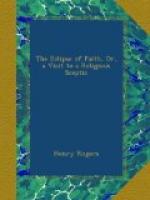OR
A visit to A religious sceptic.
Fifth edition.
Boston: Crosby, Nichols and
company,
111 Washington street.
1854.
American preface.
The effect of the perusal of this book, and the estimate put upon it by a reader, will depend upon his taking with him a right view of its design. That design seems in the mind of the writer to have been very definite and very restricted. If he should be thought to have intended an answer to all the elaborate objections from criticism and philosophy recently or renewedly urged against faith in the Christian revelation, and, still more, if the reader should suppose that the author had aimed to remove all the difficulties in the way of such a faith, he would equally insure his own disappointment, and wrong the writer. The book comes forth anonymously, but it is ascribed to Mr. Henry Rogers, some of whose very able papers in the Edinburgh Review have been republished in two octavo volumes in England, and one of whose articles, that on “Reason and Faith,” dealt with some of the topics which form the subject-matter of this volume.
The author seems to have viewed with a keenly attentive and anxious mind the generally unsettled state of opinion, equally among the literary and some of the humbler classes in England, concerning the terms and the sanction of a religious faith, especially as the issue bears upon the contents and the authority of the Bible. That he understands the state of things in which he proposes himself as one who has a word to utter, will be allowed by all candid judges, whatever criticism they may pass upon the effectiveness of his own argument. There is abundant evidence in this book of his large intimacy with the freshest forms of speculation, as developed by the free thought of our age. While he identifies these speculations with the recent writers who have adopted them, he is not to be understood as allowing that these writers have originated any novel speculations, or excelled the sceptics of former times in acuteness, or plausibility, or success in urging their cause. He adopts the method of the Platonic dialogue, and exhibits a dialectic skill in confounding by objections when objections can be made to do service as arguments. His frank admission that he leaves insurmountable objections and unfathomable mysteries still involved in the theme, a portion of whose range alone he traverses, should secure him from the imputation of having attempted too much, or of boastfulness for what he considers that he has accomplished.
The truculent notice of this book in the Westminster Review for July is wholly unworthy of the reputation and the claims of that journal. Probably a careful perusal of the book is an essential condition for enlightening the mind of the writer, and for rectifying his judgment, so far as information has power to promote candor.




